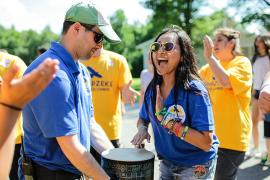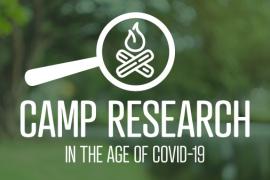According to a new survey from the New York Times, “Just one in seven parents said their children would be returning to school full time this fall, and for most children, remote school requires hands-on help from an adult at home,” said Times writer Claire Cain Miller.
School systems across the country sticking with online learning or moving to hybrid models where children attend school only a portion of the week represent a significant ongoing challenge for parents juggling work responsibilities with caring for their children and overseeing their schoolwork.
With three-fourths of parents of elementary-school-aged children and half of parents of high-school-aged children admitting they need adult help to do virtual learning, camps may be in a position to help parents by providing online learning sites and supervision during and after regular school hours.
What should you consider before making a determination that your camp should offer community educational support?
- What are your local/nearby school districts doing: full-time at school, online-only school, or a hybrid system? Reach out to your school district/school principals and let them know you’re available to help. You may be able to establish a partnership to help identify families in need of supervision during school hours.
- Is there demand in your area or among your regular summer camp participants? Do parents in your area need a place during the day where their children will receive supervised care while they do their schoolwork?
- Are your facilities adequate?
- Are you in compliance with your state child care regulations?
Is There a Demand?
Keep in mind that your normal camp population may be different from the school district(s) you are closest to. Camp Fitch, a YMCA overnight camp in Pennsylvania, used social media to survey local families in Erie County (only about 5 percent of their market during summer camp season) about the need for a remote weekday learning environment for their school-aged children, said Tom Parker, Camp Fitch executive director. They received more than 130 survey responses confirming the need for such a program.
Consider, too, the specific needs of children and families in your area when designing your program.
“Camp Fitch is offering full, half, and extended day options for local families with the flexibility to choose every week only the days families need,” Parker said.
Andy Shlensky, owner and director of North Star Camp for Boys in Wisconsin, is offering a residential Fall Camp that will build a camp program around participants’ school commitments. “The aim is to provide a developmental, social, and emotional learning experience around their academic requirements that their regular schools will continue to provide,” said Shlensky. “We believe that Fall Camp at North Star provides a unique opportunity to allow kids to both grow and enjoy themselves as we continue to navigate the COVID-19 pandemic.”
North Star is asking parents to email their children’s daily school schedule, and camp staff will create the campers’ schedules “to allow for flexibility for classroom time, mealtimes, and breaks as each camper’s school schedule allows, including taking into account time zone differences.”
Campers are required to attend their full day of classes and complete all schoolwork before they can participate in camp activities.
“We know that Fall Camp is not a perfect solution for all children,” Shlensky said,” but for kids who are missing out on opportunities to be social and active because of remote learning, this is a great way to give them these important moments.”
Planning support in their community, the Salvation Army Redwood Glen Camp and Conference Center is working on a hybrid day camp for kids from low-income families. “We will be providing academic support by way of proctoring the assigned daily online curriculum minutes and providing STEAM activities and homework support from 9:00 a.m. to 2:00 p.m. and then a traditional afterschool type program from 2:00 to 4:00,” said Ed Covert, Redwood Glen executive director. Children in the program will be assigned to and remain in a cohort pod of seven to 10 students throughout their enrollment.
Adequate Facilities?
Experience from camps this summer shows that to be successful, camps must implement the full complement of nonpharmaceutical interventions (review the ACA Field Guide for these risk-mitigation measures). In addition to being able to take care of basic needs and having enough space to adhere to your state’s social distancing and other COVID-19 protocols, do you have:
- Enough staff (including medical) to provide proper supervision?
- High-speed internet and enough bandwidth for multiple users?
- The ability to offer meal service?
- Cold-weather facilities with enough space to adhere to social distancing?
- Financial feasibility?
Are You in Compliance?
State child care regulations for your educational support/daytime supervision program may differ from those to which your summer camp programs must adhere. Check with your state authority to confirm you are in compliance with the law.
Additional Considerations
While offering educational support programs at your camp may represent additional revenue in a difficult year, there is also considerable overhead associated with such programs, including staff and heating costs when the weather turns cold.
Parker said, “It isn’t really about revenue right now. It’s about deeper relationships. This is a great opportunity for community partnering.” Camp Fitch created a fundraising event to support local low-income families participating in their program.
In some cases, camp programs designed to fill remote school supervision gaps during the day may be eligible to receive Child Care and Development Fund (CCDF) subsidies for school-age children for time spent at camp completing remote, virtual, or online schoolwork. According to the US Office of Child Care, camps can supervise children’s remote learning, but they can’t teach. That being said, individual states may have additional restrictions, so check with your state’s regulatory authority, and for more information on your camp’s eligibility to receive CCDF subsidies, refer to the Administration of Children and Families’ CCDF Frequently Asked Questions in Response to COVID-19.
“Raising children has always been a community endeavor, and suddenly the village that parents relied on is gone. It’s taking a toll on parents’ careers, families’ well-being, and children’s education,” said Miller.
Camps have an opportunity to stand in this gap further strengthening ties to their communities and helping families overcome pandemic-related work and school challenges in the process.
Plus, said Shlensky, “Even with less time dedicated to traditional camp activities, the most crucial parts of the camp experience will remain intact. The campers will continue to be active, engaged, outdoors, and among friends. They will continue to grow and develop socially and emotionally.
Photo credit: Ridofranz/iStock /via Getty Images.
The views and opinions expressed by contributors are their own and do not necessarily reflect the views of the American Camp Association or ACA employees.




